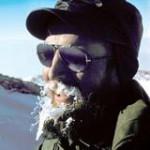Category Science & Technology
Study: Can nature’s leading indicators presage environmental disaster?
Economists use leading indicators - the drivers of economic performance - to take the temperature of the economy and predict the future. Now, in a new study, scientists take a page from the social science handbook and use leading indicators of the environment to presage the potential collapse of ecosystems.
Study: Risky behavior prominent on teen MySpace profiles
More than half of adolescent MySpace users mention risky behaviors such as sex, violence or substance use on their personal Web profiles.
Expectant brains help predict anxiety treatment success
A network of emotion-regulating brain regions implicated in the pathological worry that can grip patients with anxiety disorders may also be useful for predicting the benefits of treatment.
Scientists isolate genes that made 1918 flu lethal
By mixing and matching a contemporary flu virus with the "Spanish flu" - a virus that killed between 20 and 50 million people 90 years ago in history's most devastating outbreak of infectious disease - researchers have identified a set of three genes that helped underpin the extraordinary virulence of the 1918 virus.
UW-Madison engineer receives presidential award
A University of Wisconsin–Madison engineer has been honored with the country's highest honor for scientists at the beginning of their research careers.
Seven UW–Madison faculty honored as AAAS fellows
Seven members of the University of Wisconsin–Madison faculty have been elected fellows of the American Association for the Advancement of Science (AAAS), it was announced Dec. 18.
Cognitive computing: Building a machine that can learn from experience
A UW–Madison researcher says the goal of building a computer as quick and flexible as a small mammalian brain is more daunting than it sounds.
Q&A: Professor provides analysis of work on nanotechnology research
Life sciences communication professor Dietram Scheufele provides Wisconsin Week with a more in-depth look at his research on nanotechnology and religion.
Genetic change extends mouse life, points to possible treatment for ALS
There are many ways to die, but amyotrophic lateral sclerosis (ALS), also known as Lou Gehrig's disease, must be one of the worst. By the time a patient notices muscle weakness, the neurons that control the muscles have already begun dying, in an untreatable process that brings death within two to five years.
For nano, religion in U.S. dictates a wary view
When it comes to the world of the very, very small - nanotechnology - Americans have a big problem: Nano and its capacity to alter the fundamentals of nature, it seems, are failing the moral litmus test of religion.
Can milk help prevent transplant rejections?
Could Wisconsin's signature product – milk – hold the key to one of the biggest problems in organ transplantation? Hans Sollinger, the surgeon who heads the transplant program at UW Hospital and Clinics, is betting on it.
Cave’s climate clues show ancient empires declined during dry spell
The decline of the Roman and Byzantine empires in the Eastern Mediterranean more than 1,400 years ago may have been driven by unfavorable climate changes.
Researchers examine role of soil patterns in dam restoration
Looking at the site today, it's easy to forget that a dam and pond stood for 43 years on the University of Wisconsin–Madison's Franbrook Farm Research Station in southwestern Wisconsin. All traces of the structure are gone, and acres of plants, both native and weedy, now carpet the floor of the former basin.
Uncovering the real dirt on granular flow
Assistant Professor Dan Negrut and his team at the Simulation-Based Engineering Laboratory are developing innovative computer simulation methods for parallel computers to analyze granular material motion much faster than is possible with current technologies.
Poll shows Wisconsin residents support wetlands protection
Wisconsin residents are concerned about the destruction of the state's remaining wetlands but don't know much about the wetland types that are most threatened, according to a recent statewide poll.
Glass Lab to host open house
The UW–Madison Glass Lab will host an open house with glass-blowing demonstrations and a student glass sale Saturday-Sunday, Dec. 6-7.
Fast molecular rearrangements hold key to plastic’s toughness
Plastics are everywhere in our modern world, largely due to properties that render the materials tough and durable, but lightweight and easily workable. One of their most useful qualities, however - the ability to bend rather than break when put under stress - is also one of the most puzzling.











